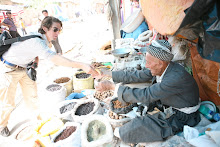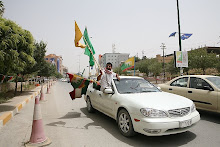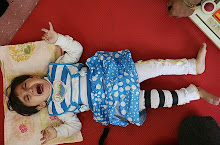The bombing of Maarat al Noaman on Oct 19th highlights a significant shift in tactics for both sides of this conflict.
The town has been a target for rebel forces for some time, due to it's crucial strategic position on a major cross roads on the M5 highway, between Aleppo and Damascus, and they had only just taken it.
Facing a stalemate in the city of Aleppo, rebel groups have been attempting for some time, to cut off supplies arriving from Latakia and Damascus. Thereby placing considerable pressure on regime troops and increasing their odds in the city.
It had been thought that Assad might send reinforcements from Damascus to deal with this situation - (which would have weakened his grip there) but instead he chose to send jets and demolish it.
While this danger always existed, many thought he might be somewhat restrained in this region, as he sought to win back 'hearts and minds'. Instead it becomes clear that he has given up all hope of doing this, and at all costs will keep this supply line open.
It also places considerable pressure on the rebels, who must now deal with the repercussions of this horrific bomb. It remains to be seen if civilians will continue to stay behind the rebels, or whether perhaps they begin to wishing that things went back to how they once were.
Friday, 19 October 2012
Friday, 5 October 2012
PKK in syria
On the 3rd October Syrian troops attempting to
regain control of the Alshmal gate along the border with Turkey shelled the area, hitting the nearby Turkish
town of Akcakele. They killed 5 members of the same family and wounded others.
The Syrians, desperate to quell the steady stream of weapons
and aid coming through the open borders have been trying for some time to
retake this area in Idlib province, but with no success. This attack was an escalation of the methods being used, and a sign of their increased frustration in the region.
Turkey retaliated, and using their radar system pinpointed the origin of the shells destroying artillery emplacements and killing a number of syrian soldiers.
While the Syrian government denies targeting the village,
and voiced sympathy for the dead, there is no doubt it was a suitably
aggressive move for Turkey, and Erdogan retaliated as many Turks hoped he would.
In the past many have been upset by his failure to act
following skirmishes along the border, such as the downing of a Turkish plane in
June and other shootings, so domestically this was a popular move.
And it is domestically that this will have the biggest
impact, for soon after the bombing, the Turkish government met to discuss what
actions it would take, and quickly gave the military the right to deploy troops
to other countries.
Erdogan has said that by no means does this amount to a declaration
of war, saying it is merely a sign that he will not be complacent or accept such 'mistakes', but what it
does do, very significantly, is allow him to strike at PKK bases inside Syria, (as
well as continuing to attack Kurdish bases in N.Iraq)
This is relevant for 2 reasons. First of all it is imperative
for the Turks that they counter the rise of Kurdish autonomy, especially after
their growing power in N. Iraq. One of the things that Turkey is most afraid of
is the rise of the Kurds in the wake of Assad’s downfall, having already armed
them heavily to use as a militia against the FSA.
Just yesterday in fact the PKK yesterday set up road blocks near the
N.Western town of Afrin to hold it for the government, and already we have seen
them attacking the FSA Farouk brigade in Idlib.
Secondly it is well known that Erdogan hopes to change the
Turkish political system to a presidential or semi-presidential one. He is
holding presidential elections in 2013 (with himself running as president) but
to do so he needs the support of the ultra nationalist, anti kurdish party who
hold a crucial 52 seats in parliament. Appeasing their desire to attack Kurdish
bases will go a long way to getting this approval.
And so today’s move is not so much about how Turkey chooses
to deal with the immediate Syrian crisis on it’s border (it will never attack
without the full backing of NATO, nor without a long term solution in mind) but
it does show that it is willing (while international eyes are turned in other
directions) to deal with the Kurdish issue in a far more permanent and
aggressive way.
Expect to see attacks on Kurdish bases rise.
Wednesday, 3 October 2012
Initial soundings....
We met some of our contacts today, and what we have learnt
is worrying. Things on the ground have changed immensely since we were last
here, and new fronts in the battle are opening up.
While the main war between rebels and the regime continues
stronger than ever, the most talked about is that between jihadis, salafis and
the FSA. The FSA is doing it's best to distance itself from these other elements but this is hard.
Fighters from around the world have begun to arrive - some in support of the legitimate uprising against Assad, but others to wage jihad against the Shi'ites. This has caused ripples than can be felt everywhere and some rebels have gone as far as to admit that things may have been better under Assad than they will be following his departure. One thing that everyone agrees on is that this conflict will continue for many years to come.
Fighters from around the world have begun to arrive - some in support of the legitimate uprising against Assad, but others to wage jihad against the Shi'ites. This has caused ripples than can be felt everywhere and some rebels have gone as far as to admit that things may have been better under Assad than they will be following his departure. One thing that everyone agrees on is that this conflict will continue for many years to come.
With Saudi, Quatar, Iran, Hezbollah, Russia, China and the
US all having a stake in this, and attempting in one way or another to destabilize elements in the region, this is not at all surprising; though I will delve into
politics tomorrow.
In the mean time the immediacy of staying alive in the face
of a far greater military force remains the main concern, and the regime continues
to shell and attack from the air. This goes on unabated claiming many innocent
lives per day, and should remain at the forefront of our minds.
Food is at a low, inflation impossibly high, and basic
medical supplies in grave shortage. The FSA has better weapons now– rockets
and heavy artillery, though nothing to counter the regime. They have shot down 14 planes using new weapons; supposedly sourced from Turkey, and they
continue to be armed and financed in a big way.
There are rumours of a secret agreement between the US, UK,
Saudi, Turkey and Qatar, that allows Turkish weapons to be filtered through to
the rebels, though at present I have only little evidence of this.
The border with Turkey is no longer held by the regime and the
FSA controls the vast majority of northern territories. As such we should be
expected to cross through legitimate border crossings with no problems –
however infighting between rebels means this may not be true. I can’t mention
details yet, but it may be better for us to cross at night and illegally, than
to go through a certain gate, such is the hostility.
There continues to be more FSA infighting between urban and
rural brigades, (often the well-financed ones vs the not so well financed.
There are also arguments between defectors within the FSA
(who are accused of abandoning a sinking ship,) and those Syrians who have fought the regime
from the beginning. (The FSA leaderships's recent move to inside Syria, is an attempt to validate
it’s position and unite the factions.)
Sources also tell us that:
-Barrel bombs are the new weapon of choice for the Syrian regime – packed full of TNT, oil and shrapnel they are dropped from helicopters and are far more devastating than other weapons.
-Farouk brigade is fighting a full on conflict with jihadi's in idlib province
-Hamas is now also at odds with the regime.
-Shipments from Benghazi to Mercine carrying both medicines and arms arrive sporadically.
- the CIA has been infiltrating Syria in the guise of western journalists in order to assess jihadi strengths;
-Barrel bombs are the new weapon of choice for the Syrian regime – packed full of TNT, oil and shrapnel they are dropped from helicopters and are far more devastating than other weapons.
-Farouk brigade is fighting a full on conflict with jihadi's in idlib province
-Hamas is now also at odds with the regime.
-Shipments from Benghazi to Mercine carrying both medicines and arms arrive sporadically.
- the CIA has been infiltrating Syria in the guise of western journalists in order to assess jihadi strengths;
We anticipate many stories once inside Syria; Foreign fighters,
field hospitals, urban clashes, western involvement, and training camps. Though once again our true plans must
remain a secret, and I must leave you here.
Subscribe to:
Comments (Atom)














































